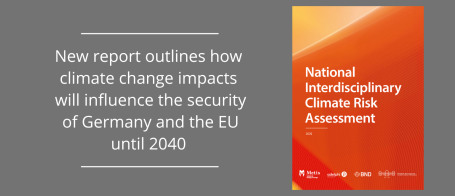Germany's National Interdisciplinary Climate Risk Assessment (Nationale Interdisziplinäre Klimarisiko Einschätzung)
This assessment was commissioned by the German Federal Foreign Office and the German Federal Ministry of Defence as mandated by Germany’s National Security Strategy. The Metis Institute for Strategy and Foresight at the University of the Bundeswehr Munich, the Potsdam Institute for Climate Impact Research and adelphi research, together with the Bundesnachrichtendienst (Federal Intelligence Service), prepared this analysis. The assessment combines state of the art climate change research with analysis of how these impacts will ultimately influence the security of Germany and the EU until 2040.
The assessment is divided into five thematic sections which focus on different levels of threats to German security.
- Chapter 1 describes how climate change will impair economic growth, health and wellbeing and physical infrastructure. These impacts, largely weather-related, weaken Germany both directly and indirectly by making it less resilient against other external threats.
- Chapter 2 offers an analysis of how extreme weather and climate-induced resource scarcity are likely to cause destabilisation in fragile contexts. The resulting humanitarian crises and geopolitical tensions at the global level will negatively affect the security and prosperity of the EU.
- Chapter 3 examines how the decarbonisation of the world economy, which is necessary for mitigating climate change, will lead to several second-order effects. Some, like energy independence, will strengthen European resilience. Others, such as the destabilising consequences this will have for some fossil fuel export dependent states, entail new security risks.
- Chapter 4 highlights how, beyond the immediate risks to peace and security, the ways climate change mitigation and adaptation are handled by the international community will shape the future of the international order, with significant risks and opportunities for Germany’s and the EU’s global standing.
- Chapter 5 focusses on the domestic dimensions that policy responses to climate change will have. Climate policy needs to balance the necessity of quick and ambitious action with the growing risks of backlash that transition does not happen in socially just fashion.
The assessment concludes by suggesting four areas of action to safeguard Germany’s national security in the face of climate change. With respect to mitigation, Germany needs to ensure a quick and socially just domestic decarbonisation while also using climate diplomacy to advocate for ambitious international climate action. To adapt to impending climate change impacts, it will need to build up national resilience while also doing everything in Germany’s power to support international resilience and stability. Anyone thinking about security needs to think about climate as well.
This assessment was originally published by Metis Institute for Strategy and Foresight. You can download the full report (available in German and English) and explore key findings on scrollytelling website here.
Share on


